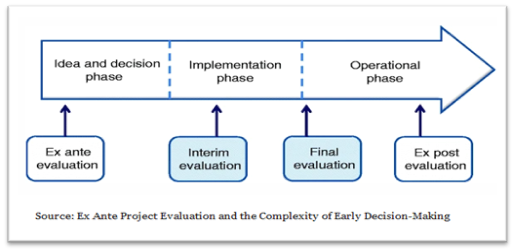

Ex-Ante Evaluation
November 30, -0001, Evaluation Observatory

As the term 'ex-ante’ implies, an ‘ex-ante-evaluation’ is an assessment done to predict the impact of a policy or program prior to its implementation. It essentially helps one answer what might happen if a given policy is implemented?
An ex-ante evaluation is considered critical in the policy formulation phase for three reasons: (a) to identify the optimal policy design to achieve specific targets (b) avoid the implementation of ineffective policies; and (c) provide information on both expected and unintended effects of a policy or program (UNCTAD, 2016).
It is useful tool in selecting the most beneficial alternatives to realize intended project outcomes, and supports the decision making process through a set of logical steps. It also aims to improve program quality by optimizing the use of resources through an iterative process(Samset & Christensen, 2015)

Figure 11: Evaluation of an undertaking at different points in time
List of recommended resources:
For a broad overview

-
Published by ResInfra, this resource introduces practitioners to Ex-Ante evaluation and gives a overview of tools and approaches.
For in depth understanding

-
Developed by the Government of the Republic of Moldova, this resource gives a brief explaination of the various stages involved in an Ex-Ante Public Policy Evaluation. Although developed from a governance perspective, the student of evaluation would find this step by step guide enlightening.
Case Study

-
OECD has developed this resource which explains the rationale and process for ex-ante poverty impact assessment. It also guides practitioners on supporting and monitoring ex-ante poverty impact assessment.

-
From the United Nations Conference on Trade and Development (UNCTAD), this resource provides evaluation practitioners with a clear and concise understanding of ex-ante evaluations and an overview of gendersensitive ex-ante evaluations of trade policies

-
Written by Petra E. TODD and Kenneth I. WOLPIN, this case study illustrates the application of ex ante evaluation methods using data from the PROGRESA school subsidy randomized experiment in Mexico

-
Written by François Bourguignon, Francisco H. G. Ferreira and Phillippe G. Leite, this resource illustrates the application of Ex-ante evaluation to conditional cash transfer programs in Brazil.

-
Published by Asian Development Bank, this resource provides practical techniques to policymakers for evaluating the potential economic effects of a Free Trade Agreement (FTA). It provides practitioners with methods of ExAnte evaluations for FTAs – namely, (i) Trade indicators, (ii) Software for Market Analysis and Restrictions on Trade (SMART), and the (iii) Global Trade Analysis Project (GTAP), and discusses their strengths and limitations.

-
Developed by FI-Compass, this video highlights significance of ex-ante in the overall lifecycle of financial instruments and explains the steps involved using easy to understand visual aids.
Toolkits

-
Developed by the European Evaluation Network for Rural Development, Part III of the document provides a toolbox for ex-ante evaluation, including template TOR, Indicative terms, suggested evaluation questions and a draft list of indicators.

-
This document is developed by Japan International Cooperative Agency (JICA), It provides a list of the major checkpoints in conducting Ex-Ante evaluations (p. 122) and enlists the contents and issues to remember in Ex-Ante Evaluations (p.129).
Further Reading

-
The research paper written by Knut Samset and Tom Christensen explain how Ex-Ante Assessment increases the likelihood of successful project outcomes. The last part of this paper presents an empirical study of 23 projects examining the complexity of processes occurring at the idea- and decision phases.

-
This resource is a part of Symposium on Policy Evaluation in the EU. It focuses on the interface between Ex-Ante and Ex-Post Evaluations, and their contributions to policy learning, with an attention to gender equality using a comparative approach.
You may also like

Big Data: An Introduction and Application in the Social Sector
August 30, 2021

Building an Evaluation Ecosystem: Perspectives from Evaluation Associations - Key Takeaways from the Webinars
August 30, 2021

GENSA Celebrates One Year, and Keynote by Katherine Hay
August 30, 2021

